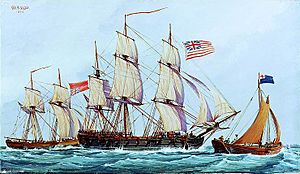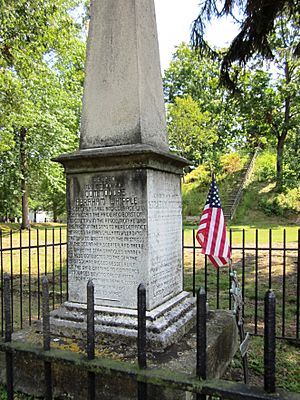Abraham Whipple facts for kids
Quick facts for kids
Abraham Whipple
|
|
|---|---|
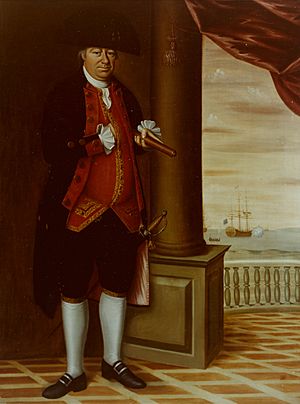
Abraham Whipple, by Edward Savage
|
|
| Personal details | |
| Born | September 26, 1733 Providence, Colony of Rhode Island |
| Died | May 27, 1819 (aged 85) Marietta, Ohio |
| Resting place | Mound Cemetery, Marietta |
| Relations | Ebenezer Sproat (son-in-law) |
| Signature | |
| Military service | |
| Allegiance | United States |
| Branch/service | Continental Navy |
| Years of service | 1775–1780 |
| Rank | Commodore |
| Battles/wars | American Revolutionary War |
Commander Abraham Whipple (born September 26, 1733 – died May 27, 1819) was an American naval officer. He is famous for fighting in the Continental Navy during the American Revolutionary War. He also helped to start the town of Marietta, Ohio.
Whipple was born near Providence, Rhode Island. From a young age, he loved the sea and became a sailor. He worked in trade with the West Indies. During the French and Indian War, he was a privateer. He commanded a ship called Game Cock from 1759 to 1760. In just six months, he captured 23 French ships.
In 1772, Whipple led a group that burned the British ship Gaspee. This event was an early spark of the American Revolution. He was also the first person to sail an ocean-going ship 2,000 miles down the Ohio River. This opened up trade for the Northwest Territory. Abraham Whipple was a member of the Society of the Cincinnati in Rhode Island.
Contents
Early Life and Family
Abraham Whipple was born on September 26, 1733. He married Sarah Hopkins on August 2, 1761. They had three children: John, Catherine, and Mary. Their daughter Catherine later married Colonel Ebenezer Sproat. Colonel Sproat was an officer in the Continental Army.
Fighting for Freedom
As American colonists grew unhappy with British rule, they began to protest. These protests often turned into acts of defiance.
The Gaspee Affair
One important event happened on June 9, 1772. Whipple led 50 Rhode Islanders to capture and burn the British ship Gaspee. This ship had run aground near Pawtuxet Village while chasing another ship.
After the Gaspee was burned, Captain James Wallace of the British ship HMS Rose sent Whipple a message. Wallace wrote, "You Abraham Whipple on June 10, 1772, burned his majesty's vessel the Gaspee and I will hang you at the yard arm!" Whipple famously replied, "Sir, always catch a man before you hang him."
Serving Rhode Island
Three years later, the Rhode Island General Assembly made Whipple a commodore. He was given command of two ships to protect the colony's trade. On June 15, 1775, Whipple and his men captured a smaller ship that belonged to HMS Rose.
After sailing near Narragansett Bay, he went to Bermuda. His mission was to get gunpowder for the colony. On his way back, Whipple brought new naval recruits to Philadelphia. When his ship, Katy, arrived there, the Continental Congress took it over. They turned it into a warship called Providence.
Whipple became a captain in the Continental Navy on December 22, 1775. He was given command of the 24-gun ship Columbus. From February to April 1776, he led the ship on an important mission. This was the first Continental Navy-Marine Corps mission to land troops from the sea. They sailed to New Providence in the Bahamas. Their goal was to capture important military supplies from the British soldiers in Nassau.
After returning to New England, Whipple captured five British ships. On March 27, 1778, his ship ran aground near Point Judith, Rhode Island. Whipple and his crew took what they could from the ship. Then they left it and escaped capture on land.
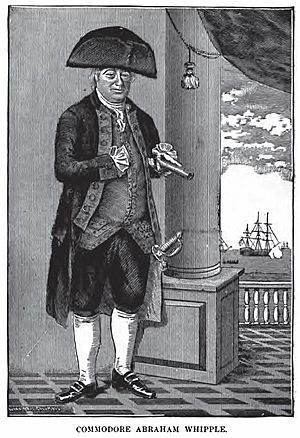
Next, Whipple was given command of the 28-gun frigate Providence. On April 30, 1778, he bravely sailed through a British blockade. He damaged HMS Lark and outran another British ship. The Providence then sailed across the Atlantic Ocean to France. It carried important messages about agreements between France and the American colonies.
In France, the Providence picked up guns and supplies for the Continental Army. Then, the Providence and another ship, the Boston, sailed back to the colonies. On the way, they captured three more enemy ships.
When he returned, Whipple took command of a small group of ships. This group included the Providence, Ranger, and Queen of France. In July 1779, his ships met a large British convoy in thick fog. Whipple cleverly hid his guns and raised the British flag. This made his ships look like they were British. He then captured 11 ships from the convoy. Eight of these ships carried valuable goods. The total value was over one million dollars, which was a huge amount of money at the time. This made it one of the richest captures of the entire war.
Whipple then sailed near Bermuda before arriving at Charleston, South Carolina. In December 1779, British forces threatened Charleston. This was a very important port for the Americans. Whipple moved the guns and crews from his ships onto land. They helped to strengthen the defenses against the British attack.
However, after a tough four-month siege, the British forces were too strong. The American forces had to surrender on May 12, 1780. Whipple became a prisoner of war for the British. He was later released to Chester, Pennsylvania. After this, he did not fight in the war anymore. When the war ended, Whipple became a farmer near Cranston, Rhode Island.
Later Life and Legacy
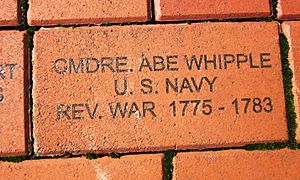
For the rest of his life, Whipple was a farmer. He also spent some time as a merchant ship captain. In 1788, the Ohio Company of Associates was formed. People began to move west into the Ohio territory. Whipple and his family became pioneers. They were among the first people to settle the town of Marietta, Ohio. He was also the first owner named for Charleston, Vermont.
Congress gave Whipple a pension for his important service in helping America win its independence. Whipple died in Marietta, Ohio, on May 27, 1819. He was buried at Mound Cemetery in Marietta. His gravestone reads:
Sacred to the memory of Commodore Abraham Whipple whose naval skill and courage will ever remain the pride and boast of his country. In the revolution he was the first on the seas to hurl defiance at proud Britain, gallantly leading the way to wrest from the mistress of the ocean her scepter, and there to wave the star spangled banner. He also conducted to the sea the first square rigged vessel built on the Ohio, opening to commerce resources beyond calculation. Born September 26th, A.D. 1733. Died May 27th, 1819. Aged 85 years.
Several ships in the United States Navy have been named USS Whipple to honor him. There is also a Whipple Street, Avenue, or Court in almost every town in Rhode Island.
Images for kids
 | James B. Knighten |
 | Azellia White |
 | Willa Brown |


